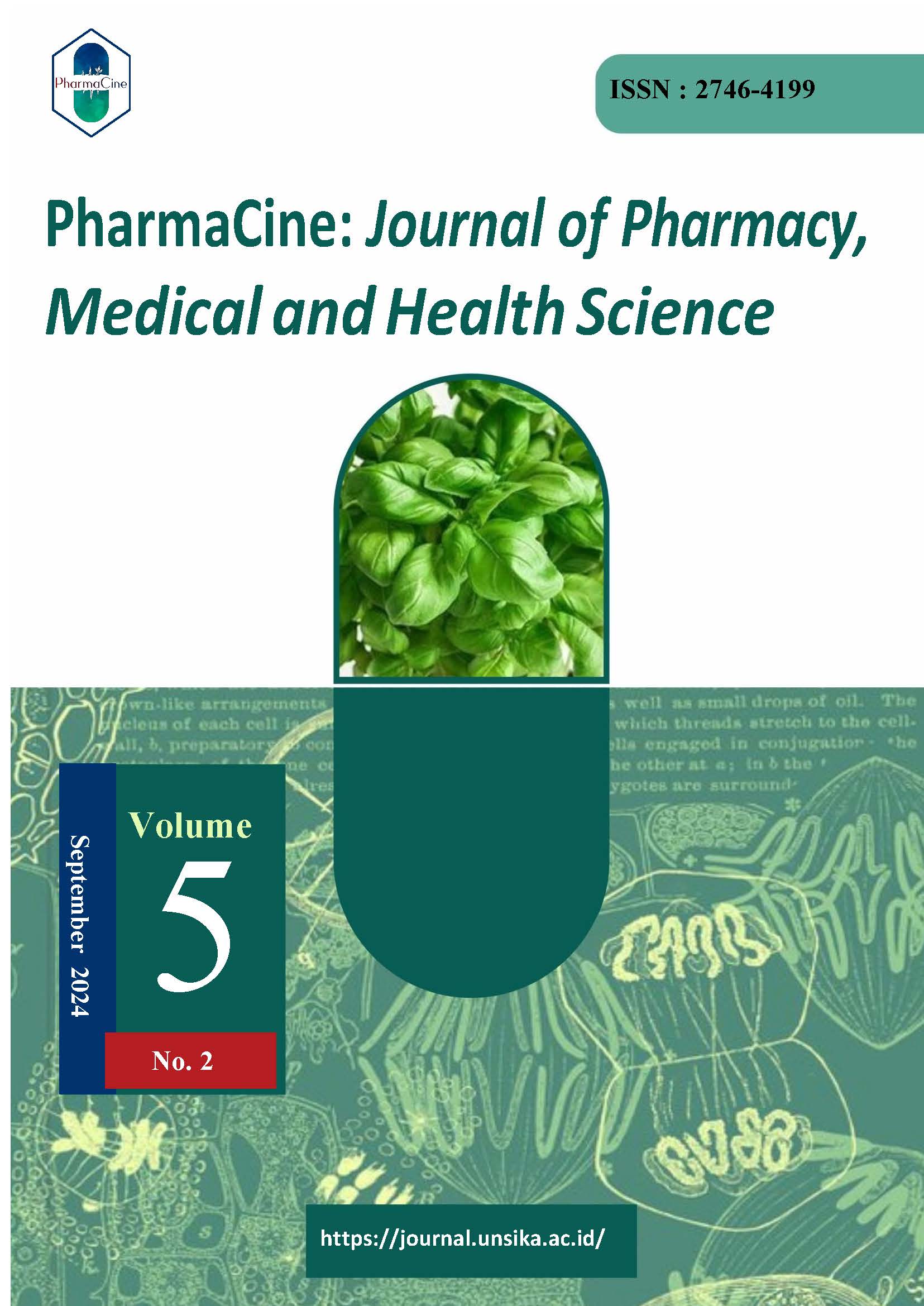Case Study of Government Regulation of The Republic Of Indonesia No.51 of 2009 Concerning Pharmaceutical Work “Pharmacist in Jombang Suspected of Violating Pharmaceutical Code of Ethics” Studi Kasus Peraturan Pemerintahan Republik Indonesia No.51 Tahun 2009 tentang Pekerjaan “Kefarmasian Apoteker di Jombang Diduga Langgar Kode Etik Kefarmasian”
Main Article Content
Abstract
Bacakground: Pharmacists are health workers who have important responsibilities in drug management. However, there are still many violations of the code of ethics and lack of understanding of the regulations governing pharmaceutical practices, which can potentially endanger patients. Aim: This study aims to analyze the impact, sanctions, and legal protection related to the provision of expired drugs to patients. Method: The method in this research is qualitative descriptive analysis. The author collected data from various sources, including relevant regulations, case studies, and academic literature, to assess pharmacists' compliance with applicable pharmaceutical regulations. Results: Many pharmacists have not fully complied with existing regulations, especially in terms of drug management and storage. The findings also indicate the need for stricter law enforcement as well as increased training for pharmacists in understanding ethics and regulations. Conclusion: dispensing expired medicines has the potential to cause serious health impacts, including decreased drug efficacy and increased risk of side effects for patients. To address violations in the management of expired drugs, the relevant regulations provide for strict law enforcement as a sanction for violators, so as to encourage compliance with existing standards. In addition, legal protection for patients is stipulated in the law, which guarantees their right to obtain safe and quality medicines, in accordance with established quality standards.
Keywords : Expired medication; pharmacy code of ethics; pharmaceutical work
Downloads
Article Details

This work is licensed under a Creative Commons Attribution-ShareAlike 4.0 International License.
Authors who publish in PharmaCine: Journal of Pharmacy, Medical and Health Science agree to the following terms:
- Authors retain copyright and grant the journal right of first publication with the work simultaneously licensed under a Creative Commons Attribution-ShareAlike 4.0 International License that allows others to share the work with an acknowledgment of the work's authorship and initial publication in this journal.
- Authors can enter into separate, additional contractual arrangements for the non-exclusive distribution of the journal's published version of the work (e.g., post it to an institutional repository or publish it in a book), with an acknowledgment of its initial publication in this journal.
- Authors are permitted and encouraged to post their work online (e.g., in institutional repositories or on their website) prior to and during the submission process, as it can lead to productive exchanges, as well as earlier and greater citation of published work (See The Effect of Open Access).
PharmaCine : Journal of Pharmacy, Medical and Health Science by https://journal.unsika.ac.id/ is licensed under a Creative Commons Attribution-ShareAlike 4.0 International License.
You are free to:
- Share, copy and redistribute the material in any medium or format
- Adapt, remix, transform, and build upon the material for any purpose, even commercially.
- The licensor cannot revoke these freedoms as long as you follow the license terms.
References
Dominica D, Putra DP, Yulihasri Y. Effect of Pharmacist Presence to Pharmaceutical Service at Pharmacies of Padang City, Indonesia). J Sains Farm Klin. 2016;3(1):99.
Arlitadelina IGAD, Endah Kusumaningrum A. Analisis Pelanggaran Apoteker Di Rumah Sakit Pada Kasus Administrasi Error Berujung Pidana. J Huk Kesehat Indones. 2022;1(02):97–105.
Craske M, Hardeman W, Steel N, Twigg MJ. Pharmacist-led medication reviews: A scoping review of systematic reviews. PLoS One [Internet]. 2024;19(9):1–11. Available from: http://dx.doi.org/10.1371/journal.pone.0309729
Wahyuni A, Aryzki S, Yuliana I. Evaluasi Penyimpanan Sediaan Farmasi Di Gudang Puskesmas Se Kota Banjarmasin. J Insa Farm Indones. 2019;2(2):166–74.
Parumpu FA, Rumi A, Matara D. Analisis Manajemen Penyimpanan Obat Rusak dan Obat Kedaluwarsa di Instalasi RSUD Mokopido Tolitoli. J Islam Pharm. 2022;7(1):52–6.
Evans M V., Andréambeloson T, Randriamihaja M, Ihantamalala F, Cordier L, Cowley G, et al. Geographic barriers to care persist at the community healthcare level: Evidence from rural Madagascar. PLOS Glob Public Heal. 2022;2(12):1–21.
Moudzie ZP. Peranan Badan Pengawas Obat dan Makanan dalam Perlindungan Konsumen Terhadap Obat Racikan Apotek Tanpa Resep Dokter. Jurist-Diction. 2021;4(5):2091.
Ikhsan M, Wahab S. Kepastian Hukum Tenaga Kefarmasian Dalam Menyelenggarakan Pelayanan Kefarmasian. J Huk Kesehat Indones. 2022;1(02):106–20.
Ferreri S, Hughes T, Pharmacy MSI, 2020 undefined. Medication therapy management: current challenges. Taylor Fr [Internet]. 2021;16(5 May). Available from: https://www.tandfonline.com/doi/abs/10.2147/IPRP.S179628
Liu J, Zheng B, Tang H. The science of rural human settlements: a comprehensive overview. Front Environ Sci. 2023;11(December):1–23.
Al-Diery T, Freeman H, Page AT, Cross AJ, Hawthorne D, Lee K. What types of information do pharmacists include in comprehensive medication management review reports? A qualitative content analysis. Int J Clin Pharm [Internet]. 2023;45(3):712–21. Available from: https://doi.org/10.1007/s11096-023-01561-5
Miller R, Wafula F, Onoka CA, Saligram P, Musiega A, Ogira D, et al. When technology precedes regulation: The challenges and opportunities of e-pharmacy in low-income and middle-income countries. BMJ Glob Heal. 2021;6(5):1–7.
Disease I. Understand Medicinal Plants. 2024
Kementerian Kesehatan Republik Indonesia. Permenkes Republik Indonesia No. 9 Tahun 2017 tentang Pedoman Kode Etik Apoteker. Jakarta: Kementerian Kesehatan RI; 2017.
Badan Pengawas Obat dan Makanan Republik Indonesia. Peraturan BPOM Nomor 4 Tahun 2018 tentang Pengawasan Pengelolaan Obat, Bahan Obat, Narkotika, Psikotropika, dan Prekursor Farmasi di Fasilitas Pelayanan Kefarmasian. Jakarta: BPOM RI; 2018.
Kementerian Kesehatan Republik Indonesia. Peraturan Pemerintah Republik Indonesia No. 51 Tahun 2009 tentang Pekerjaan Kefarmasian. Jakarta: Kementerian Kesehatan RI; 2009.

